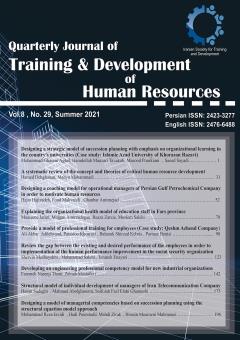Reviewing a systematic of the concept and theories of critical human resource development
Subject Areas :hamed dehghanan 1 * , Mahya Mohammadi 2
1 - Allame
2 - Allame
Keywords: human resource developmentConceptTheoriesSystematic review,
Abstract :
The purpose of this article is to study the existing literature in the field of critical human resource development, which leads to the creation of a framework including concepts and theories related to this field. For this purpose, this research is written based on a systematic review method on existing research in this field. First, a large number of articles entitled Human Resource Development (HRD) were selected from reputable databases such as SAGE, Emerald Insight, Google Scholar, ScienceDirect, and then articles with the keyword critical or perspectives were selected and the rest were removed. After studying the remaining articles, 6 articles with richer literature were selected for review. The results showed that the critical human resource development approach means that learning and development activities are pursued with sufficient awareness of power relations, emotions and organizational policy in the form of the concept of critical learning. Also theories related to this approach include theories of self and work, learning at work, and emotion. Finally, in order to implement critical human resource development, organizational contexts, stakeholders, methods and processes in each of the four areas involved in critical human resource development, including relating, learning, changing and organizing, should be examined.
Sambrook, S. Critical HRD: a concept analysis. Personnel Review, (2008). Vol. 38 Iss 1 pp. 61 – 73.
Bohonos, J W. Including Critical Whiteness Studies in the Critical Human Resource Development Family: A Proposed Theoretical Framework. Adult Education Quarterly, (2019). Vol. 69(4), 315–337.
Bierema, L. & Callahan, J L. Transforming HRD: A Framework for Critical HRD Practice. Advances in Developing Human Resources, (2014). 1–16.
Trehan, K. and Rigg, C. “Working with experiential learning: a critical perspective in practice”, in Reynolds, M. and Vince, R. (Eds), The Handbook of Experiential and Management Education, Oxford University Press, Oxford. (2007).
Sambrook, S. ‘A critical time for HRD?’, Critical Management Studies 3 International Conference, Lancaster University, July, (2004).
Trehan, K. & Rigg,. Theorising critical HRD: a paradox of intricacy and discrepancy. Journal of European Industrial Training, (2011). Vol. 35 No. 3, pp. 276-290.
Mosavizadeh, N, Atashzadeh Shorideh, F & Shabani, F. The Impact of New Leadership Styles on Employee Creativity: A Systematic Review. Journal of Shahid Beheshti University (2016). Vol 26 (92), 59-77.
Elliott, C . and Turnbull, S. Critical Thinking in Human Resource Development, First published by Routledge. (2005).
Palmer, I. and Hardy, C. Thinking about Management, London: Sage. (2000).
Kolb, D. Experiential Learning, Englewood Cliffs, NJ: Prentice-Hall. (1984).
Candy, P.C. Self-Direction for Lifelong Learning: A Comprehensive Guide to Theory and Practice, San Francisco, CA: Jossey-Bass. (1991).
Marsick, V.J. & Watkins, K.E. Informal and Incidental Learning in the Workplace, London: Routledge, (1990).
Romiszowski, A.J. Designing Instructional Systems: Decision Making in Course Planning and Curriculum Design, London: Kogan Page, (1982).
Robinson, D.G. & Robinson, J.C. Training For Impact, San Francisco, CA: Jossey-Bass, (1989).
Martin, J. Cultures in Organizations: Three Perspectives, Oxford: Oxford University, (1992).
Walton, J. “How shall a thing be called? An argumentation on the efficacy of the term HRD,” Human Resource Development Review, (2003). 2, 3: 310–26.
Britzman, D.B. Lost Subjects, Contested Objects: Toward a Psychoanalytic Inquiry of Learning, Albany, NY: SUNY Press, (1998).
West, L. Doctors On The Edge: General Practitioners, Health and Learning In the Inner-City, London: Free Association Press, (2001).
Fenwick, T. “Putting meaning into workplace learning,” in A.L. Wilson and E.R. Hayes (eds) Handbook of Adult and Continuing Education (New Edition), San Francisco, CA: Jossey-Bass, (2000). 294–311.
Bierema, L.L. “Development of the individual leads to more productive workplaces,” in R.W. Rowden (ed.) Workplace Learning: Debating Five Critical Questions of Theory and Practice, New Directions for Adult and Continuing Education, No. 72 (Winter), San Francisco, CA: Jossey-Bass, (1996). 21–8.
Fenwick, T.J. “Transgressive possibilities in post-corporate enterprise culture,” in R.O. Smith, J.M. Dirkx, P.L. Eddy, P.L. Farrell, and M. Polzin (eds) AERC 2001: Proceedings of the 42nd Annual Adult Education Research Conference, East Lansing, MI: Michigan State University, (2001). 131–7.
Wenger, E. Communities of Practice: Learning, Meaning, and Identity, New York: Cambridge University Press, (1998).
Deems, T.A. “Vital work: Adult development within the natural workplace,” 39th Annual Adult Education Research Conference Proceedings, San Antonio, TX: University of the Incarnate Word, (1998).
Daley, B. “Learning and professional practice: A study of four professions,” Adult Education Quarterly, (2001). 52, 1: 39–54.
Lepak, D. P., & Snell, S. A. Managing the human resource architecture for knowledge-based competition. In S. Jackson, M. Hitt, & A. Denisi (Eds.), Managing knowledge for sustained competitive advantage: Designing strategies for effective human resource management (pp. 127-154). San Francisco: Jossey-Bass, (2003).
McGuire, D., Garavan, T.N., O’Donnell, D. &Watson, S. “Metaperspectives and HRD: Lessons for Research and Practice”, Advances in Developing Human Resources, (2007). Vol. 9, No. 1, p. 120-140.
Hatcher, T. & Lee, M. “Ethics and HRD: a new approach to leading responsible organizations”, Proceedings of the Annual AHRD Conference, Academy of Human Resource Development, Minneapolis, MN, (2003).
Vince, R. “Ideas for critical practitioners”, in Elliott, C. and Turnbull, S. (Eds), Critical Thinking in Human Resource Development, Routledge Studies in Human Resource Development, Routledge, London, (2005). pp. 26-36.
Burrell, G. “Critical dialogues on organization”, Ephemera, (2001). Vol. 1 No. 1, pp. 11-29.
Ruona, W. E. A. Core beliefs in human resource development: A journey for the profession and its professionals. Advances in Developing Human Resources, (2000). 7, 1-27.
Lewin, K. Field theory in social science. New York, NY: Harper & Brothers, (1951).
Rigg, C., Trehan, K. and Stewart, J. (Eds) Beyond Critical Human Resource Development, Pearsons, London, (2006).

